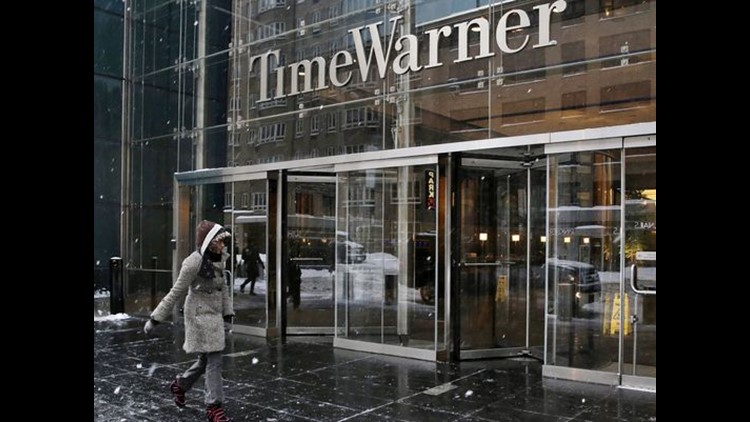AT&T reached a deal Saturday to buy Time Warner for more than $80 billion, a surprising acquisition that reflects the telecom giant’s desire to amass reputable TV and film content to diversify its massive but mature business of providing Internet access.
The deal could be announced as early as Saturday evening, the person familiar with the situation told USA TODAY, speaking on condition of anonymity because the agreement was not yet ready to be announced.
AT&T and Time Warner couldn't be immediately reached for comment. The agreement values Time Warner, with a diverse media portfolio that includes HBO, CNN, TNT, TBS, Warner Bros., theme parks, Bleacher Report and a 10% stake in streaming service Hulu, at about $105-110 per share.
The agreement, if approved by regulators, would be one of the largest acquisitions ever in the telecom-media sector. It also lays bare AT&T's grand ambition to control sizable market shares in both content and distribution businesses, a prospect that will surely trigger concern and scrutiny among federal regulators and consumer rights advocates.
A year ago, AT&T shocked Wall Street by paying $48.5 billion to buy satellite TV provider DirecTV, giving it an instant access to nearly all domestic markets for selling its pay-TV service and Internet-TV bundles. Analysts suggested at the time that AT&T would look to beef up its content offerings — already made attractive by DirecTV’s NFL Sunday Ticket deal — to fully seize the benefits of the acquisition.
AT&T’s growth strategy also entails the need to evolve its main business lines – providing Internet and wireless services. While customers’ bills for their telecom needs seemingly grow every year, the Internet market – wired and wireless – in the U.S. is saturated and growth potential is limited.
DirecTV and AT&T’s other pay-TV service, UVerse, provide a level of revenue diversity. But investors still have been clamoring AT&T to look elsewhere for growth, particularly as the market turbulence brought on by streaming technology and “cord-cutting” provides both opportunities and threats. With the integration of DirecTV largely completed, AT&T planned on focusing on buying more media and entertainment content companies.
Similar concerns also drove Verizon to pay $4.8 billion to buy Yahoo's core businesses, including Yahoo Sports and Yahoo Finance. Verizon also paid $4.4 billion to buy AOL a year earlier.
Meanwhile, Comcast, another Internet service giant, continues to prove the benefits of business diversity quarter after quarter with revenues from its NBC Universal unit – including NBC, Telemundo, Universal Pictures and Universal Studios – compensating for declines in its cable TV service customers.
AT&T also has plans to provide its own video streaming services to compete with Netflix and Amazon in the coming months. To get ready for the launch, AT&T has been signing deals with content providers, and its ownership of Time Warner's programming will provide a significant boost in not only the new service's show lineup but in negotiating with other media companies.
AT&T also gets direct access to HBO's critically acclaimed shows to woo its fans to the new streaming service, as well as HBO's know-how in streaming directly to subscribers. HBO has been been operating its subscription-based streaming service, HBO Now, since last year. "This could help its competitive positioning to not only traditional carriers Verizon, T-Mobile and Sprint but also emerging players Comcast, Netflix, and Hulu," wrote Amy Yong, an industry analyst at Macquarie Capital, in an investor note.
For Time Warner, being acquired has seemed almost inevitable. Its assets, particularly HBO, NBA basketball programming on TNT and Warner Bros. film studio, are highly prized by other media companies.
Time Warner is also one of the few substantial TV and film content makers that can be bought in the market without having to overcome a complex controlling stock structure set up by the controlling family – a la the Redstones of Viacom or the Murdochs of 21st Century Fox.
In July, 2014, 21st Century Fox, controlled by billionaire mogul Rupert Murdoch, offered to pay about $80 billion for Time Warner, or $84 a share in cash and stock. If completed, it would have been at the time the largest media merger since the disastrous AOL purchase of Time Warner for $162 billion in 2000.
A month later, Murdoch withdrew the offer after Time Warner Chairman and CEO Jeff Bewkes said his company was worth more and rejected it.
Time Warner once operated a cable TV service unit, but spun it off in 2009 to focus on media content businesses. Time Warner Cable, the spun-off business, was acquired by Charter Communications last year for $56 billion.



